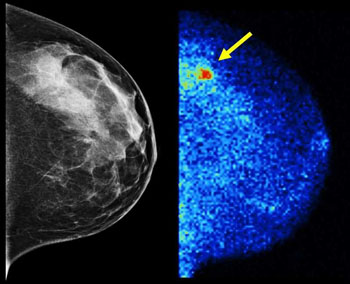New Screening Method Can Significantly Improve Detection of Breast Cancers in Dense Breast Tissue
By MedImaging International staff writers
Posted on 02 Feb 2015
A large percentage of women of screening age have dense breast tissue. Dense breast tissue is difficult to distinguish from and obscures tumors in X-ray mammography images.Posted on 02 Feb 2015
New research by clinicians at the Mayo Clinic (Rochester, MN, USA) investigates the diagnostic performance of reduced radiation-dose Molecular Breast Imaging (MBI), as a supplement to standard mammography, and will be published in the February 2015 issue of the American Journal of Roentgenology. MBI is a nuclear medicine-based breast imaging technique that works together with a radiotracer that is absorbed by cancer cells. The MBI screening technique was developed by senior author of this study Deborah J. Rhodes, MD, and a multidisciplinary team at the Mayo Clinic.

Image: Molecular Breast Imaging (right) detected 3.6 times as many invasive cancers as digital mammography (left) in the latest study of more than 1,500 women with dense breast tissue. About half of screening-age women have dense breast tissue, which digital mammography renders the same whitish shade as tumors. Results are published in the American Journal of Roentgenology (Photo courtesy of the Mayo Clinic / AJR).
The study assessed 1,651 women (without disease symptoms) who, after initial mammography, were found to have dense breast tissue. Each mammography exam was followed by a reduced-dose MBI exam.
The results of the study show that adding MBI screening (effective dose 2.4 mSv) to mammography resulted in a supplemental cancer detection rate of 8.8 per 1,000 women screened. There were 21 women diagnosed with cancer. Only two of the 21 cases were detected with mammography screening alone, 14 cases were detected using only MBI, and three cases were detected using both screening methods together.
Related Links:
Mayo Clinic














